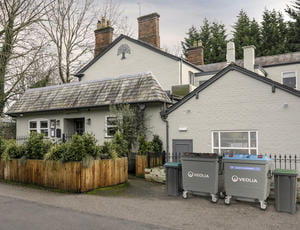Improving How We Collect & Recycle Waste Materials
Following on from the EPR and DRS consultations, Defra (the Department for Environment, Food & Rural Affairs) have published their latest consultation, on consistency of collections. This is the first consultation of this nature that has looked beyond household waste.
What Does Consistency of Collections Mean?
Consistency of collection centres around five core materials: plastic, glass, paper/card, metal, and food waste and will require businesses to segregate all of these waste streams, so that each is able to be collected and recycled separately.
Additional materials in question include aluminium foil, aerosols, and plastic film. Similar changes are being proposed for households, who will also be required to segregate their waste into the five core streams. Changes such as free garden waste collections and weekly food waste collections are also being put forward for households.
How Will We Benefit From Consistent Collections?
One of the key benefits the government is hoping to achieve is increased recycling rates. If recycling is made simpler, with easier and more consistent rules to follow, it will hopefully encourage both businesses and households to recycle more. The UK has a target of eliminating all avoidable waste by 2050, and consistency of collections plays a crucial role in achieving this.
This consultation is part of Defra's over-arching Resources & Waste Strategy, which also encapsulates the proposed launch of a Deposit Return Scheme (DRS) and an Extended Producer Responsibility (EPR) system that puts greater focus on product manufacturers. With second rounds of consultations currently still ongoing for both of these, consistency of collections is the third strand in the discussion around minimising waste, improving recycling and creating a circular economy.
How Will Consistency of Collections Impact Businesses?
Whilst the proposals offer clear benefits, there are concerns for how this will affect businesses. Consistent recycling rules will make things easier on the one hand, but the potential increase to the number of containers businesses need could be a barrier, especially for businesses with space limitations. The options being considered by Veolia present various combinations of containers, and take advantage of the proposals that plastic and metal, or glass and metal can be collected together. Depending on the needs and limitations of each business, Veolia will be able to offer a combination of containers that meet their requirements whilst segregating waste as needed.
There are also concerns over the financial impact of the new proposals on businesses, with a misconception being that more containers equals higher costs. In reality, improving waste segregation and increasing recycling could result in an average cost saving of 11%. As general waste is the most expensive to dispose of, minimising your residual waste will offer benefits, both financial and environmental.
HOW CAN VEOLIA HELP YOU?
Find out more about working with Veolia, and preparing for the introduction of consistency of collections
The pandemic and beyond: a flexible FM service that suits your needs
All businesses and organisations have faced an array of challenges over the past year. Find out how we helped some of our clients during these tough times.
F&B Manufacturing: Join our Webinar series
Register now for our FREE series of Webinar events focusing on F&B manufacturing and your journey to sustainability. Join us on the 8th June, 16th June and 22nd June
The Plastic Packaging Tax: Only one year to go
We are now on the countdown to the introduction of the Plastic Packaging Tax in April 2022. With less than a year to go, you need to know exactly how the tax will affect your business.
A powerful partnership serving the needs of the military
For the past 15 years, Veolia has been in partnership with energy distribution provider UK Power Networks Services. Find out more about what we have achieved together.







